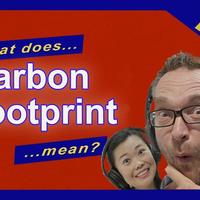What does 'carbon footprint' mean? - YouTube
Neil: Welcome back, Feifei! Good holiday?
Feifei: The best, Neil! We flew to Mexico,
then up to California,
and then drove all
the way across the States
from LA to New York.
Neil: Incredible. All in one week?
Feifei: Yes. It's just that...
Neil: What?
Feifei: I can't help thinking...
all that travelling can't be great
for the environment.
Neil: I know. You must have
a pretty big carbon footprint right now.
Feifei: Enormous.
Neil: Let's take a moment to explain this
phrase 'carbon footprint'. Then plan what
to do about it.
Feifei: Carbon dioxide is a gas
that contributes to climate change.
Neil: And your 'carbon footprint' is
the amount of carbon dioxide
you produce through your
activities - things like how much
electricity you use...
Feifei: How much oil and gas you use...
Neil: What you eat is another factor. And
of course your trips by car, plane and so on...
Feifei: If you take a lot of flights,
then you have a large carbon footprint!
Like me.
Neil: And me. And the people
in these examples.
I used the air conditioning non-stop
all summer. My carbon footprint
must be huge.
Martina has the highest carbon footprint
of all her colleagues.
She drives everywhere,
flies every weekend, and eats nothing
but red meat.
I downloaded an app to calculate
my carbon footprint. The results
are pretty shocking.
Feifei: You're listening to The English
We Speak from BBC Learning English.
The expression we're looking at
in this programme is 'carbon footprint'.
OK, we've heard the examples.
And Neil, I have a plan. It's time
to reduce my footprint.
Neil: Great. That's the verb we normally
use: reduce. We talk about reducing
our carbon footprint, by changing
the way we live. So, what's the plan?
Feifei: I'm going to cycle to work, use less
heating in winter, and...
I've got these new shoes.
Neil: Great. But, shoes?
Feifei: They're made of recycled plastic.
Fantastic, aren't they?
Neil: Well, that's one way to reduce
your footprint!
Feifei: I even brought you a pair -
a little present from my trip LA.
Neil: You're so kind. I can wear them when
I'm in Tokyo this weekend. And Paris next
week. Oh, and Iceland tomorrow.
Only kidding!
Feifei: Yes, I want to hear your plan
to reduce your carbon footprint, Neil!
Both: Bye.

